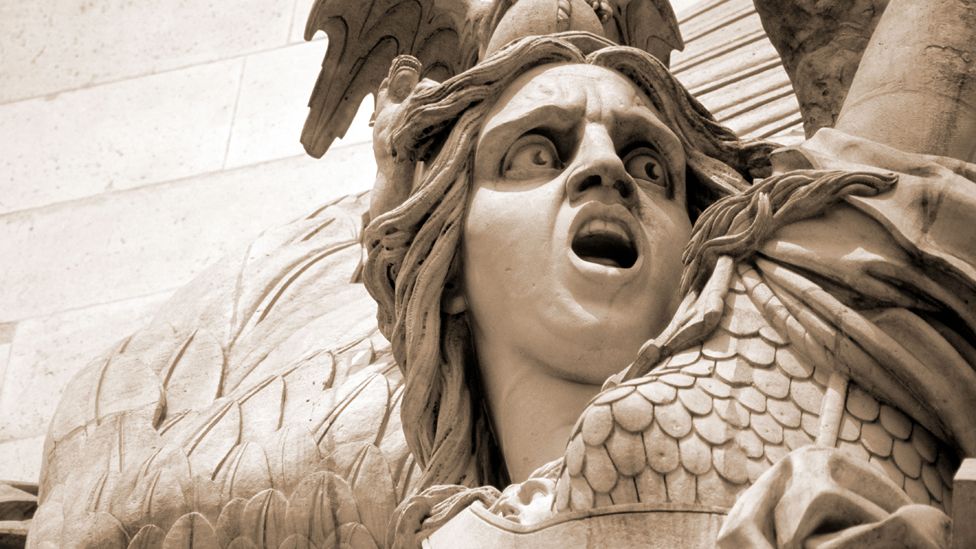What's the meaning of La Marseillaise?
-
Published

Sculpture of La Marseillaise on Paris's Arc de Triomphe
France's national anthem will be sung by English as well as French fans when the two nations' football teams meet at Wembley. What's the story behind the rousing song, asks Jon Kelly.
It's the ultimate anthem of defiance. In 1792 Claude-Joseph Rouget de Lisle, a captain in the French army, composed the song after Austrian and Prussian troops invaded France in an attempt to quell the revolution.
The mayor of Strasbourg asked Rouget de Lisle to write a song that would rally troops to "defend their homeland that is under threat". Originally titled Chant de guerre pour l'Armee du Rhin - War Song for the Army of the Rhine - it was dedicated to Marshal Nicolas Luckner, the army's Bavarian commander.
While its lyrics declare that the children of the Fatherland's day of glory has arrived, they also issue a blood-curdling warning - "ferocious soldiers" are coming under the "bloody banner" of tyranny to "cut the throats of your sons, your women". Citizens - not subjects - are urged to take up arms and "Marchons! Marchons!" - let's march, let's march.
Claude-Joseph Rouget De Lisle (1760-1836) portrayed performing La Marseillaise for the first time
It was sung by troops from Marseilles as they approached Paris, leading to its nickname. It was made France's anthem in 1795 but lost its status under Napoleon I and was suppressed during the Bourbon restoration.
La Marseillaise became the national anthem again during France's third republic - the era from 1870 when the modern idea of what France means was laid down, according to David Walker, professor emeritus of French at the University of Sheffield.
Most people don't pay all that much attention to the "fairly bloodthirsty" lyrics, he says. More important, he believes, is that unlike God Save the Queen, La Marseillaise is "not an aristocratic song. It's about the people, it's about being a citizen". What's more, "it's a rousing anthem and people can sing it with gusto".
Not everyone likes its martial theme. Valery Giscard d'Estaing, president of France from 1974 to 1981, slowed the rhythm because he considered it too warlike. The line "may impure blood water our fields" has been cited by critics who consider the anthem racist.
But its message of defiance and resistance have proved incredibly potent at key moments in France's history - invasion during World War One, and occupation during World War Two.
France cyclists hummed it as they rode the Tour de France through German-ruled Alsace between 1906 and 1910. In one of Casablanca's most memorable scenes, resistance leader Victor Laszlo orders a band to play it in order to drown out singing by Nazi troops.
'The Greatest National Anthem in the World, Ever'
Hence its resonance in the wake of the Paris attacks, which the Islamic State militant group said it carried out. La Marseillaise is "the great example of courage and solidarity when facing danger", historian Simon Schama, told the BBC's Today programme. "That's why it's so invigorating. That's why it really is the greatest national anthem in the world, ever."
La Marseillaise first verse and chorus
Allons enfants de la Patrie, (Arise, children of the Fatherland)
Le jour de gloire est arrive! (The day of glory has arrived!)
Contre nous de la tyrannie, (Against us tyranny's)
L'etendard sanglant est leve (repeat) (Bloody banner is raised)
Entendez-vous dans les campagnes (Do you hear, in the countryside)
Mugir ces feroces soldats? (The roar of those ferocious soldiers?)
Ils viennent jusque dans vos bras (They're coming right into your arms)
Egorger vos fils, vos compagnes! (To cut the throats of your sons, your women!)
Chorus: Aux armes, citoyens, (To arms, citizens)
Formez vos bataillons, (Form your battalions)
Marchons, marchons, (Let's march, let's march)
Qu'un sang impur (Let an impure blood)
Abreuve nos sillons (repeat) (Water our furrows)
Subscribe to the BBC News Magazine's email newsletter to get articles sent to your inbox.